The Right Kind of Victims

The establishment media portrays the radical left as caring for “victims” in many contexts, but the reality is that they are laser-focused not on defending but on victimizing the right kind of people. For them, pro-life, pro-family, conservative Americans are the right kind of victims. Violence against them is understandable and even desirable. But […]
We’re Returning to the Supreme Court-Join Us There!
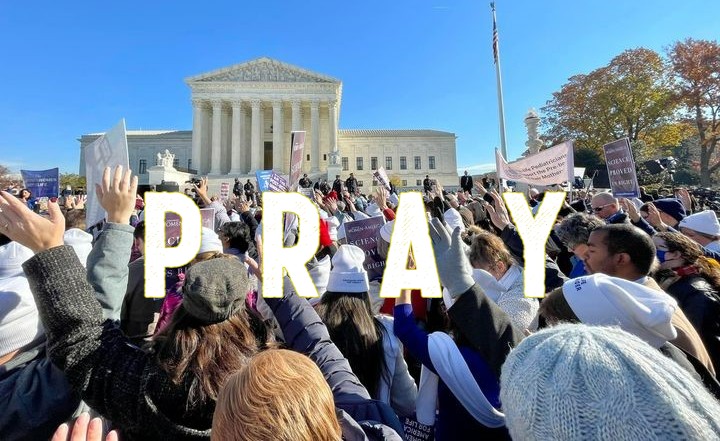
On December 1, 2021, thousands of pro-life individuals from around the country gathered in front of the Supreme Court of the United States (SCOTUS) to rally and pray while the Court heard oral arguments for Dobbs v. Jackson Women’s Health Organization, a case challenging the constitutionality of a Mississippi state law that places strict limits […]
Nance Joins Shannon Bream on Fox News @ Night

Penny Nance, CEO and President of Concerned Women for America appeared on Fox News @ Night with Shannon Bream to discuss the recent Supreme Court leak and give an overview of what a post-Roe America could look like. Watch the full interview below. https://vimeo.com/706079395
Nance to NEWSMAX: The End of Roe Is Near

Concerned Women for America’s CEO and President, Penny Nance, joined NEWSMAX to discuss the recent SCOTUS leak and the possibility of the end of Roe. Listen to the full interview below https://vimeo.com/706178871
Supreme Leak— A Law Clerk’s Perspective

By Alexandra McPhee, CWA’s Director of Government Relations Working as a judicial law clerk for the Supreme Court of Virginia remains one of the greatest experiences of my personal and professional life. I had the privilege to work under the tutelage of Justice D. Arthur Kelsey and learned immensely from his wealth of experience. […]
Steady as the Enemy Panics on Abortion

Let darkness squelch and screech at the loss of the sacrifices they value. The violent among them will stir up the multitudes to fulfill their vision and protest that the innocent are no longer as expendable. The undiscerning mob is sure to follow whichever way the wind blows, tossed to and fro — used, abused, […]
Reason Demands an End to Roe

A young wife and her husband were enthusiastically awaiting the birth of their first baby. It was a girl. They had already done a big baby shower with family and friends; they had bought all the furniture and decorated the room— a beautiful retreat of yellow and pink. They had faithfully kept every doctor’s appointment […]
Praying for Dobbs

[vc_row type=”in_container” scene_position=”center” text_color=”dark” text_align=”left” overlay_strength=”0.3″][vc_column column_padding=”no-extra-padding” column_padding_position=”all” background_color_opacity=”1″ background_hover_color_opacity=”1″ width=”1/1″][vc_column_text] Concerned Women for America Six Month Spiritual Engagement for Dobbs v Jackson Women’s Health [/vc_column_text][divider line_type=”Full Width Line”][divider line_type=”No Line” custom_height=”10″][/vc_column][/vc_row][vc_row type=”in_container” scene_position=”center” text_color=”dark” text_align=”left” overlay_strength=”0.3″][vc_column column_padding=”no-extra-padding” column_padding_position=”all” background_color_opacity=”1″ background_hover_color_opacity=”1″ width=”3/4″][vc_column_text]The December 1 oral arguments for Dobbs v. Jackson Women’s Health were just the […]
Indefensible Roe – The Scientific Track

Do not believe your lying eyes. This (pictured above) is not a baby. No sir. If it were a person, then the Supreme Court itself admitted in Roe they would not have made the decision they made to allow her to be crushed and sucked out of her mother’s womb. It is actually a good thing they […]
Supreme Court Releases Opinions in Texas Abortion Law Cases

As we discussed recently, the state of Texas presented a novel problem to the United States Supreme Court by enacting a law prohibiting abortions after a heartbeat is detected, but giving the right of enforcement to private citizens and not to any state official. Today, the Court handed down its opinion dismissing most of the […]
An Historic Day at the Supreme Court
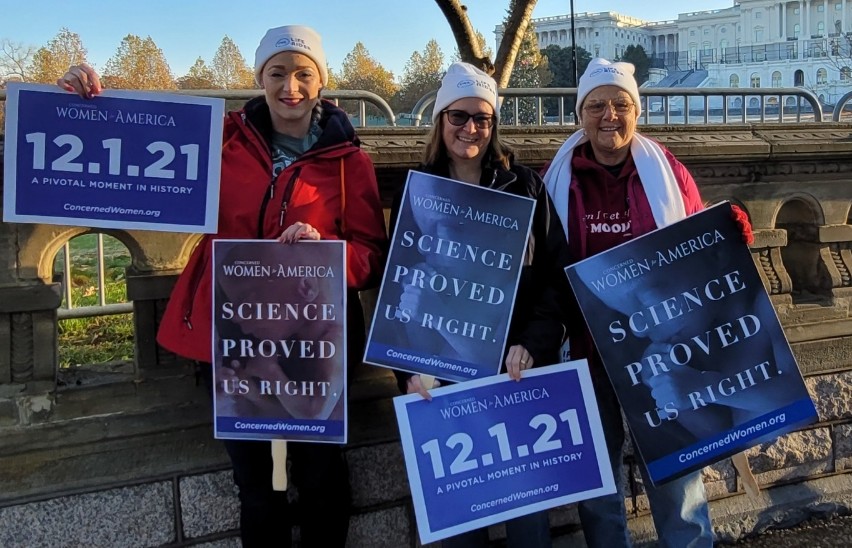
Concerned Women for America (CWA) of Maine was represented at the Supreme Court of the United States prayer rally on December 1 for oral arguments of the pro-life case Dobbs v. Jackson Women’s Health Organization. Amber Corum, Melissa Stephens, and I were honored to be present to pray and hear from over 30 great pro-life organizations […]
Webinar: What’s Next for Dobbs v. Jackson?
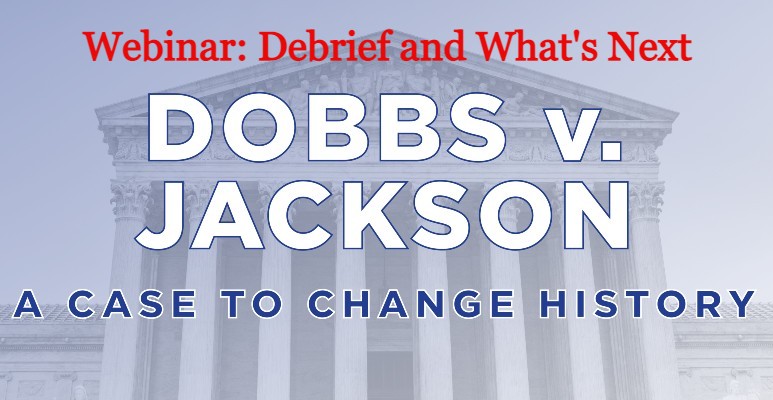
Several thousand pro-life supporters rallied and prayed outside the Supreme Court on Wednesday, December 1, as the historic Supreme Court oral arguments were heard for Dobbs v. Jackson Women’s Health Organization. Tens of thousands more joined in prayer from around the nation! Concerned Women for America (CWA) is hosting a live webinar one week after […]
After historic arguments at the Supreme Court, Roe v. Wade’s future is in doubt

Mario Diaz, Esq., CWA’s General Counsel, joined NPR’s Morning Edition with Noel King to discuss the future of Roe v. Wade following the historic Supreme Court oral arguments in Dobbs v. Jackson Women’s Health Organization.
Penny Nance Speaks at Supreme Court Rally for Life

12.1.21: A day to remember. Concerned Women for America was proud to help bring thousands of activists and college students from all over the country to Washington, D.C., to pray on the steps of the Supreme Court today while the Justices heard oral arguments in the biggest abortion case of our lifetime. While we have […]
Three Takeaways from Today’s Dobbs Oral Arguments
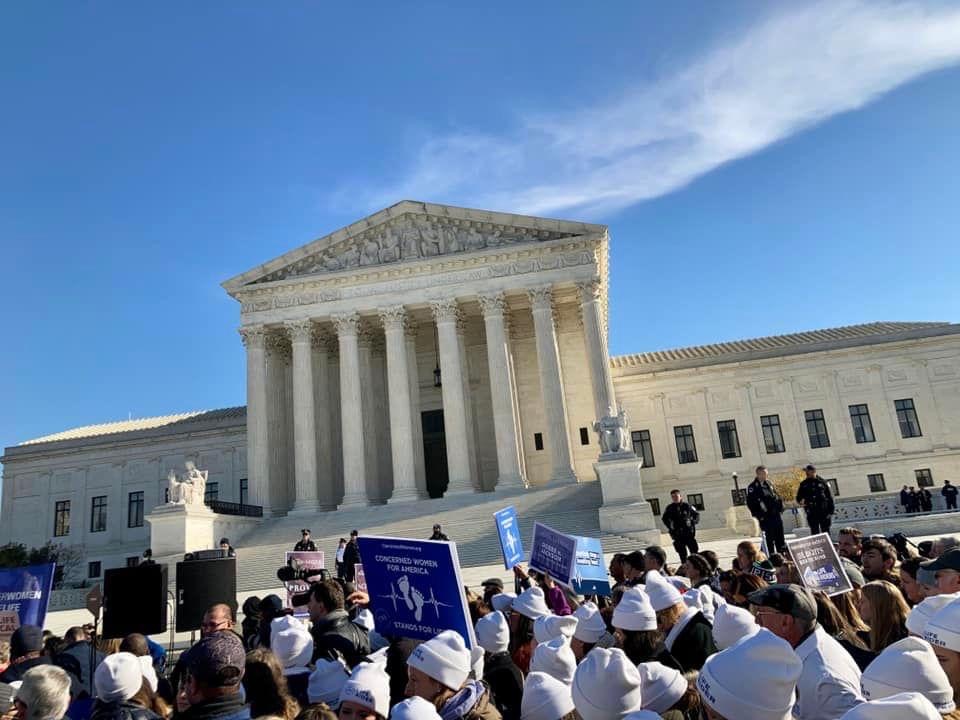
Today, the United States Supreme Court heard oral arguments on the most important pro-life case of our lifetime: Dobbs v. Jackson Women’s Health Organization. As hundreds of pro-life supporters rallied outside the courtroom (outnumbering the other side by a considerable margin!), inside the Justices heard arguments from the state of Mississippi, the Jackson abortion clinic, and the […]
SPECIAL ALERT: Science Proved Us Right. STREAM NOW!

Concerned Women for America is thrilled to drop a surprise special podcast episode TONIGHT ahead of the biggest abortion case of our lifetime being argued in front of the Supreme Court tomorrow. To brush up on the science of fetal development and the medical advancements since 1973, Penny is joined by pro-life OB/GYN Dr. Christina […]
Indefensible Roe – The Policy Track
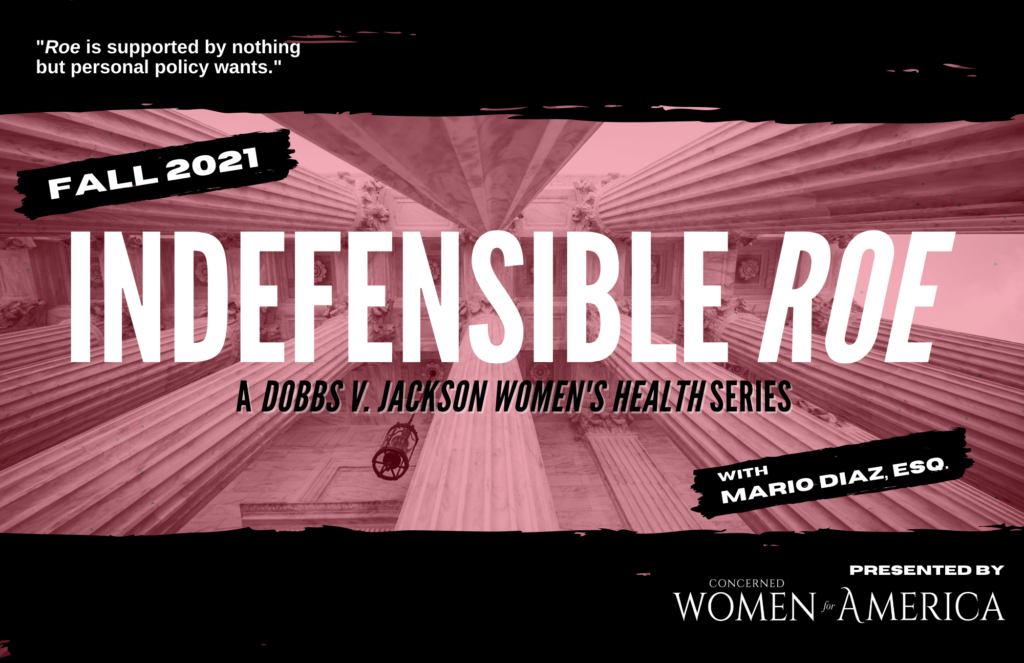
Having established that “The Constitution does not explicitly mention any right of privacy,” as the Court accurately noted in Roe, and that the Court relied on that virtual right to further invent another constitutional “right” to abortion with no basis in law, history or tradition, we turn to the Court’s dreadful shift to policymaking and why it, too, is indefensible. […]
Nance to Newsmax: This is a Civil Rights Issue

Concerned Women for America’s CEO and President, Penny Nance, joined John Bachman Now to discuss tomorrow’s historic case being argued before the Supreme Court. Listen to the full interview below to learn what to expect in tomorrow’s hearing and what the future of abortion in America could look like.
Indefensible Roe – The Legal Track

As that great bulwark of honesty Buddy the elf would say, Roe “sit[s] on a throne of lies.” This series will expose many of them in the spiritual, scientific, cultural, moral, and policy realm. But we start this endeavor with the most pressing deception as far as it concerns the U.S. Supreme Court’s upcoming considerations […]
Indefensible Roe — An Introduction

Dobbs v. Jackson Women’s Health Organization, the Mississippi case where abortionists are challenging the state’s “Gestational Age Act,” should force the United States Supreme Court to reevaluate its disastrous abortion jurisprudence. Because Mississippi’s law places strict limits on abortion after 15 weeks, it runs straight up against the Court’s nonsensical and arbitrary “viability” pronouncement which has somewhat […]
